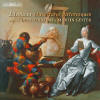Texte paru dans: / Appeared in:
*

International Record Review - (04/2013)
Pour
s'abonner / Subscription information
BIS
BIS1979

7318599919799 (ID292)
Consultez toutes les évaluations recensées pour ce cd
~~~~ Reach all the evaluations located for this CD
This generous programme features three colourfully varied orchestral suites and two string concertos whose music is informed by Polish folk idioms to which Telemann was ever partial. All five works have been previously recorded though not always played as elegantly as they are under Martin Gester’s direction. Arte dei Suonatori is one of the finest chamber ensembles around at the moment, this year celebrating its twentieth anniversary. Its period-instrument players are Polish, which perhaps gives them an especially intuitive insight to the disc’s Concertos polonois.
As I have implied, the unanimity of the string and woodwind playing and the warmth of timbre are admirable and winning qualities here; indeed, in these respects no rival that I can think of betters them. Gester directs with an assured feeling for the Frenchified overtures to the Suites and his choice of tempos is both just and effective. Perhaps if I had never heard Nikolaus Harnoncourt’s account of the splendid D major Suite with its richly textured writing for three oboes I would not be feeling that the character of the music is, on occasion, underplayed. However, that is exactly what I do feel, for graceful though Gester’s direction is, it lacks exuberance and those wonderfully demonstrative gesture s for which Harnoncourt is variously loved and hated. The B flat Suite, which, somewhere along the line has acquired the name ‘Völker-Ouvertüre’, comes across very well indeed. Its movements, evoking national traits of Turks, Swiss, Portuguese and Muskovites, are played with sensibility, though it seems at least probable that eighteenth-century ears may have picked out idiosyncrasies which elude twenty-first century ones.
The remaining Suite, which includes trumpets and timpani, is a much later work belonging to the last decade of Telemann’s life. It is one of the few such pieces that has survived in autograph score and takes various types of illness as its raison d’être. Full of his characteristic mix of irony, wit, humour and even perhaps double entendre, the music’s energy belies Telemann’s advanced years, nowhere suggesting that the octogenarian was over-concerned about his own health.
The Concertos, both of them existing in a competing version with Musica Antiqua Köln are smaller fry but nonetheless beautifully crafted and redolent of expressive allure. The B flat piece begins with a ‘Polonaise’, so marked, while the ‘Largo’ is a slow ‘mazurka’. Syncopations in its concluding movement also evoke Polish or Hanakian folk music. The G major work follows a similar pattern, with an opening ‘Polonaise’ and a third movement ‘Mazurka’.
Notwithstanding my single, earlier-voiced reservation, this is a rewarding disc with which few if any readers will be disappointed. Recorded sound is clear and ideally resonant.
Cliquez l'un ou l'autre
bouton pour découvrir bien d'autres critiques de CD
Click either button for many other reviews


